
Top 7 Tools for Data Sharing Compliance
Avoid fines up to $1.5 million and cut compliance work by 40% with the right tools for your business size and budget.

Written by
Adam Stewart
Key Points
- Pick tools that match your revenue size to avoid overpaying for features
- Boost opt-in rates from 30% to 70% with smart consent management
- Save 40% on compliance admin work with integrated automation tools
- Start with basic GDPR/CCPA coverage, then scale up as you grow
Navigating data privacy laws like GDPR, CCPA, and HIPAA is challenging, especially for small businesses. Non-compliance can result in fines ranging from $2,500 to $1.5 million or more. With 28% of breaches involving data theft and the average cost of a breach at $4.9 million, ensuring compliance is crucial for both financial stability and reputation.
Here’s a quick look at seven tools that simplify compliance by automating consent management, risk assessments, and reporting:
- Cyera: Automates data discovery and risk detection.
- OneTrust: Manages global privacy regulations and data flows.
- Enzuzo: Focused on small businesses with tools for cookie consent and privacy policies.
- Drata: Streamlines compliance workflows, especially for SOC 2 and GDPR.
- Dialzara: Handles compliance in regulated industries like healthcare and legal.
Each tool offers unique features to help businesses meet privacy regulations efficiently. Below is a comparison to help you choose the right one.
Quick Comparison
| Tool | Best For | Key Feature | Integration Focus | Compliance Focus |
|---|---|---|---|---|
| Cyera | Data discovery & classification | Real-time risk detection | Cloud & hybrid environments | GDPR, CCPA, global laws |
| OneTrust | Global compliance management | Multi-jurisdiction support | Enterprise applications | GDPR, CCPA, global laws |
| Enzuzo | Small business privacy tools | Website builder integration | WordPress, Shopify, Wix | GDPR, CCPA, PIPEDA |
| Drata | SOC 2 & security compliance | Audit prep automation | DevOps & security tools | SOC 2, GDPR, ISO 27001 |
| Dialzara | Regulated industry communication | 24/7 virtual phone service | Business communication tools | Industry-specific laws |
Select the tool that aligns with your business needs, budget, and technical setup. Compliance doesn’t have to be overwhelming when you have the right solution in place.
What to Look for in Data Sharing Compliance Tools
When selecting a compliance tool for your small business, it’s essential to find solutions that automate the legal and operational requirements of laws like GDPR, CCPA, and HIPAA. But beyond that, the tool should fit seamlessly into your existing processes and workflows.
With 75% of California businesses expected to fall under state privacy laws - and 50-75% of those earning less than $25 million annually - the demand for accessible and effective compliance tools is growing rapidly. Below are the key features to prioritize when evaluating your options. These will help ensure your tool keeps up with ever-changing privacy regulations while integrating smoothly into your business.
Automated Consent Management
Consent management is a cornerstone of privacy compliance. The right tool will simplify how you obtain, record, and manage user permissions for data usage. This not only ensures transparency and compliance but also helps you avoid hefty GDPR fines .
There’s also a financial upside. A well-designed consent banner can increase opt-in rates from 30% to 70%, boosting analytics and ad revenue. And when campaigns are based on compliant, user-approved data, conversion rates can improve by 15-20%.
Look for tools that support dynamic consent collection across multiple platforms, such as websites, web forms, SaaS apps, and consent databases. The system should also adapt quickly to new legal requirements, ensuring your consent mechanisms stay up-to-date as privacy laws evolve. This adaptability is crucial as more states and jurisdictions introduce their own regulations.
"A CMP is used to inform visitors about the types of data they'll collect and what they will use it for. They store visitor consent data and deal with visitors' requests to make alterations about the data the website has collected about them, including requests to access and erase this data. It is a necessary platform for websites to meet EU regulations for data collection." - Steve Pritchard, Managing Director, It Works Media
Third-Party Risk Assessment
Managing vendor risks is just as important as obtaining user consent. A compliance tool with third-party risk monitoring capabilities can help you evaluate and manage risks tied to data shared with external vendors. This is especially critical given that 90% of cyberattacks reported by small businesses involve data or credential theft.
Your tool should offer continuous monitoring to ensure all vendors in your data ecosystem comply with privacy regulations. It should also flag potential risks early so you can address them before they escalate into violations.
Effective tools often include data discovery and classification features to identify sensitive information across your systems. Additionally, they should offer flexible data access controls, such as attribute-based access control (ABAC), to ensure that only authorized personnel can access specific types of data.
Integration with Business Applications
A compliance tool that integrates well with your existing business applications can eliminate data silos and streamline your workflows. Companies that achieve this integration often see up to a 40% reduction in compliance-related administrative work.
Look for tools that provide real-time data synchronization across various platforms, ensuring you always have access to accurate and current information. This level of integration supports better decision-making and reduces human error through automation.
When evaluating integration options, consider the following methods based on your technical needs:
| Integration Method | Implementation Time | Technical Complexity | Best for |
|---|---|---|---|
| API Integration | 2-6 weeks | High | Real-time data sync |
| Middleware | 3-8 weeks | Medium | Legacy system connections |
| SSO | 1-3 weeks | Low | User access management |
| Webhooks | 1-4 weeks | Medium | Event-triggered updates |
Before making a decision, review your current digital environment and list all the software tools your team uses, including cloud platforms, desktop applications, and mobile apps.
Audit Trails and Reporting
To round out your compliance strategy, your tool should include detailed audit trails and reporting capabilities. These features provide the documentation needed for audits and regulatory submissions. The tool should log all data processing activities, consent changes, and access requests in a clear and organized manner.
Opt for tools with customizable dashboards that can generate compliance reports automatically, track DSARs (data subject access requests), and flag anomalies. Reports should be exportable in standard formats for easy submission to regulators or internal reviews.
Additionally, audit trail functionality should include anomaly detection to spot unusual data access patterns or potential breaches. Regular monitoring and reporting not only help maintain compliance but also provide early warnings of potential issues.
Investing in data privacy pays off - every $1 spent can yield a return of $2.70. And with 71% of consumers ready to cut ties with companies that mishandle their data, having the right compliance tool protects both your legal standing and your customer relationships.
Top 7 Tools for Data Sharing Compliance
When it comes to navigating data privacy regulations, having the right tools can make all the difference. Below are seven platforms designed to simplify compliance tasks, from automated data discovery to integrating with your existing business systems. These tools can help small businesses manage privacy regulations more effectively and efficiently.
Cyera
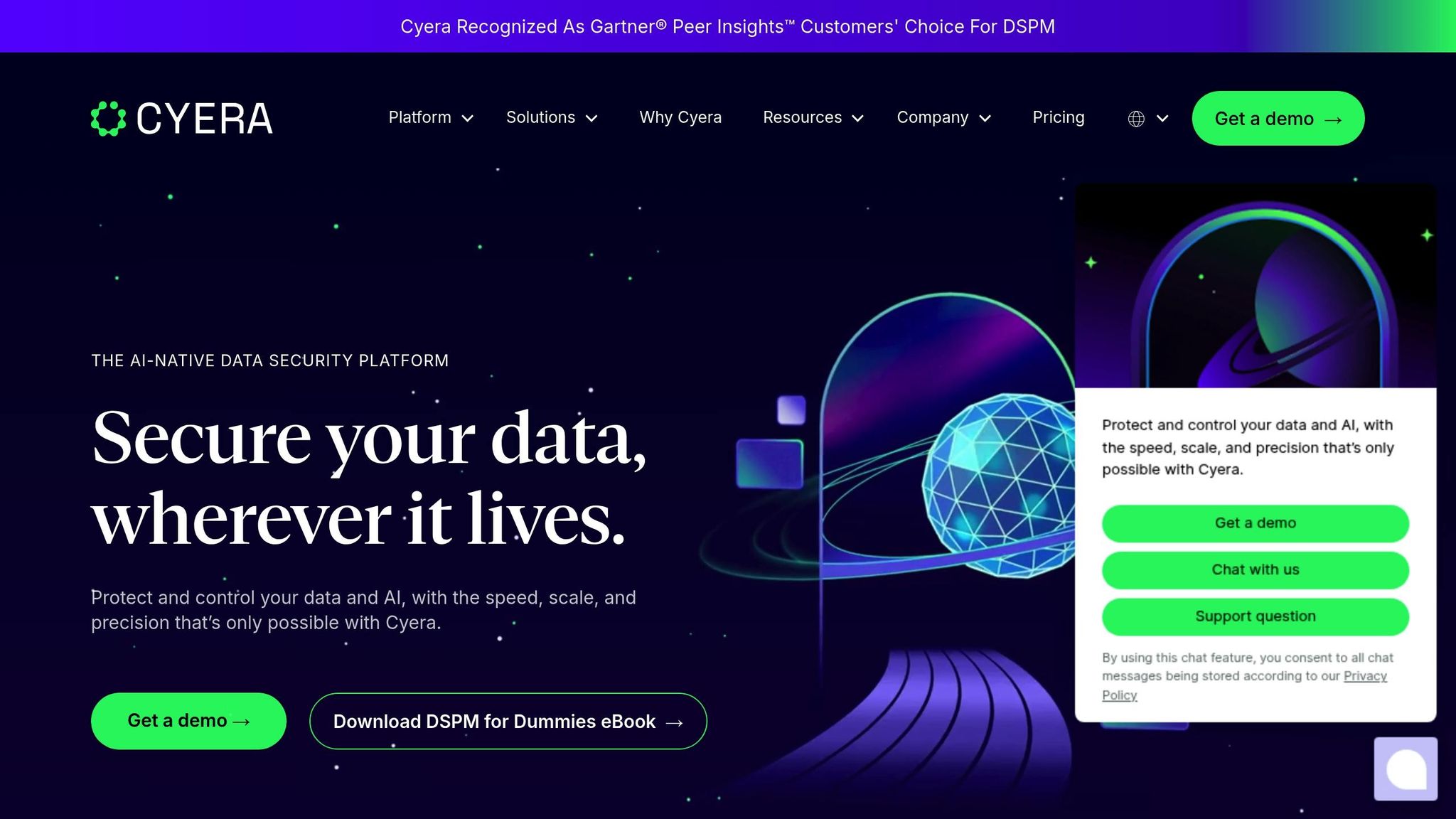
Cyera takes the complexity out of compliance with its smart automation features. It automatically detects, maps, and categorizes sensitive data with impressive accuracy, flagging potential compliance risks in real time. The platform is equipped with preset policies that align with global privacy standards, offering real-time risk monitoring and streamlined reporting. This approach not only saves time but also minimizes compliance risks.
OneTrust
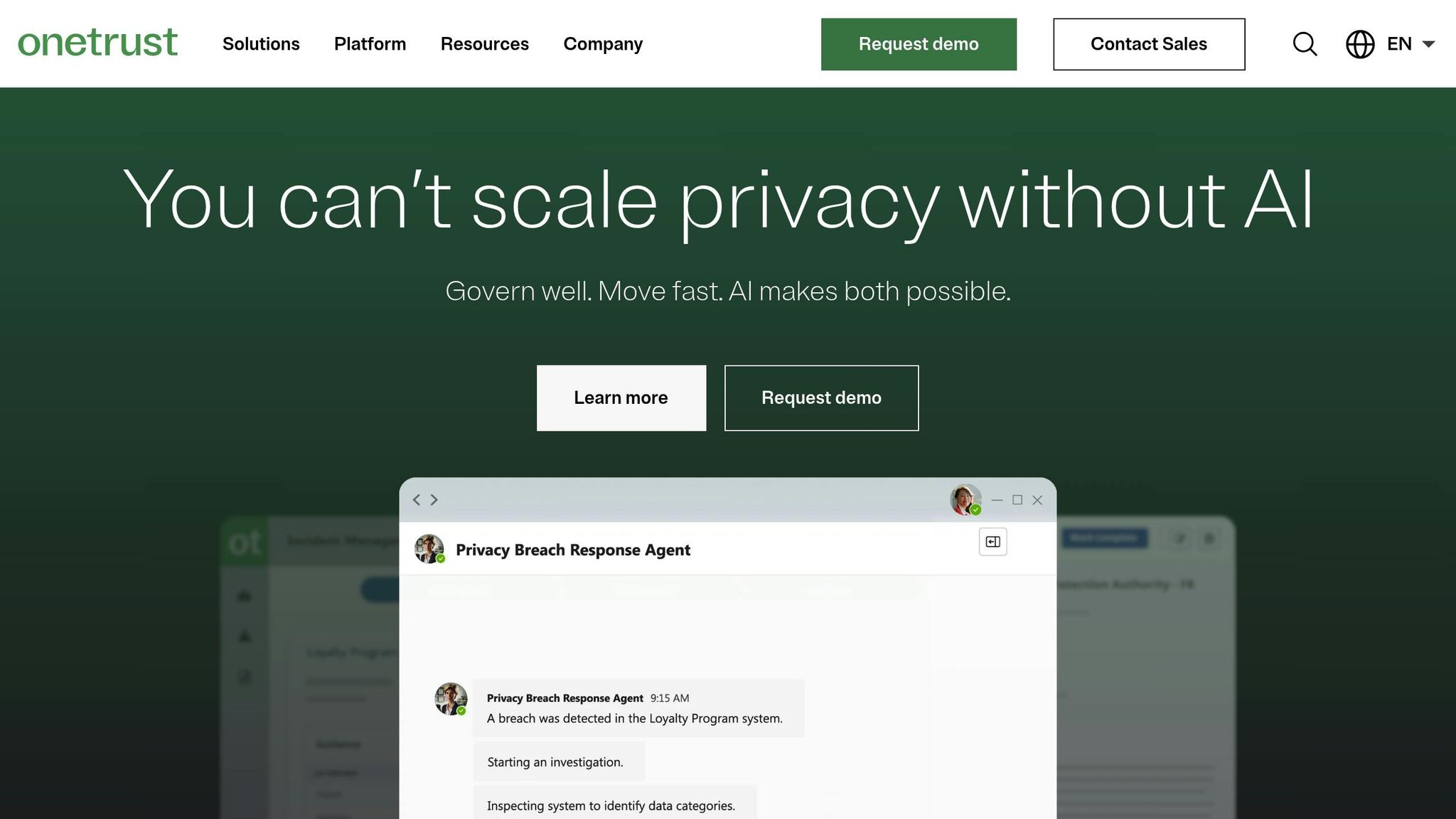
OneTrust is a versatile platform that combines data mapping, consent management, and subject rights management under one roof. It’s built to handle the demands of global privacy laws like GDPR and CCPA, as well as emerging state regulations. The platform excels at processing data subject access requests and provides a clear view of your data flows, making compliance tasks more manageable.
Enzuzo
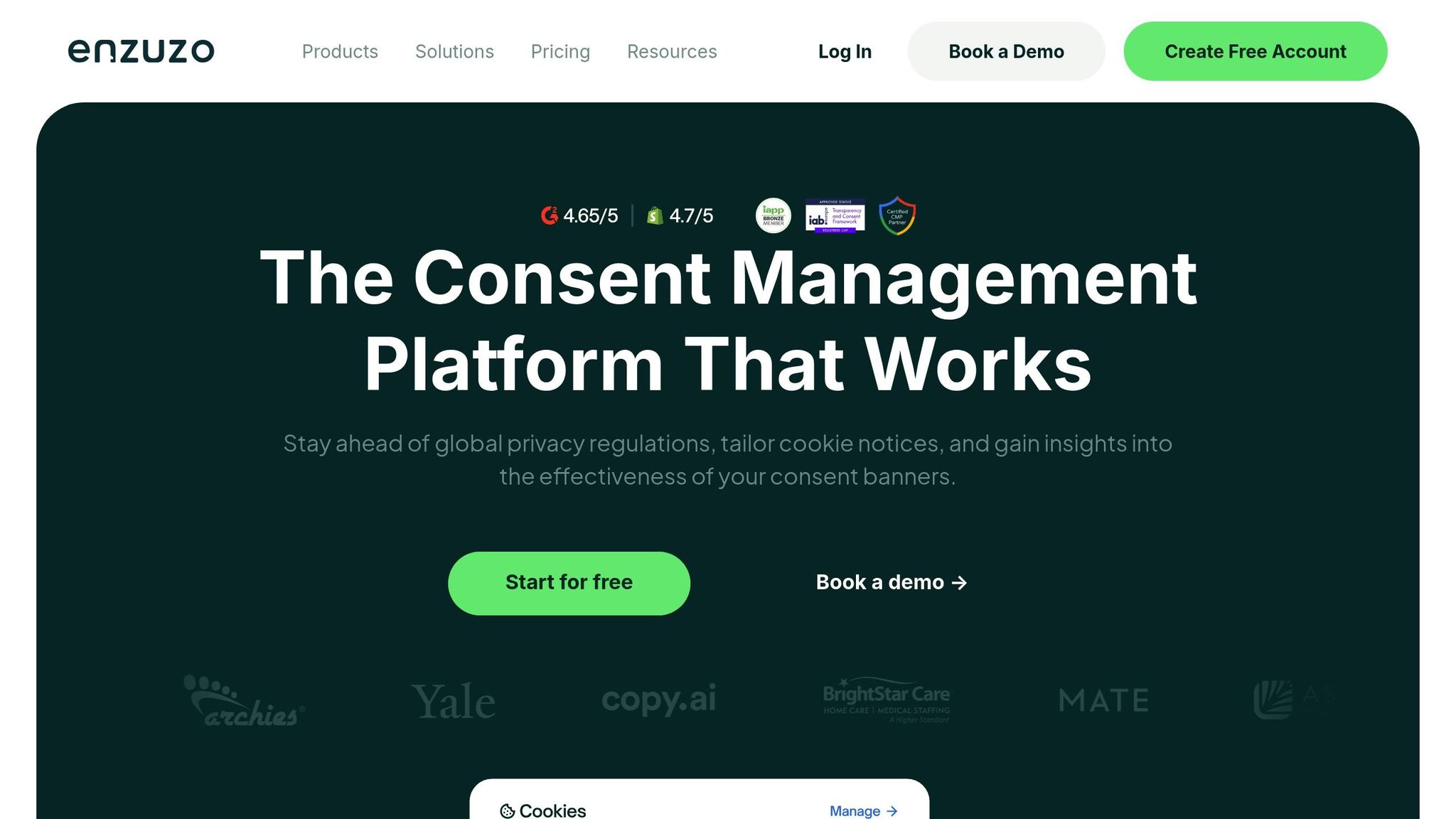
Designed specifically for small businesses, Enzuzo simplifies privacy compliance with tools for cookie consent management, automated privacy policy creation, and data subject access request (DSAR) automation. It integrates seamlessly with popular platforms like WordPress, Shopify, and Wix, automating many manual tasks. This ensures your privacy practices stay aligned with regulations such as GDPR, CCPA, and PIPEDA.
Drata
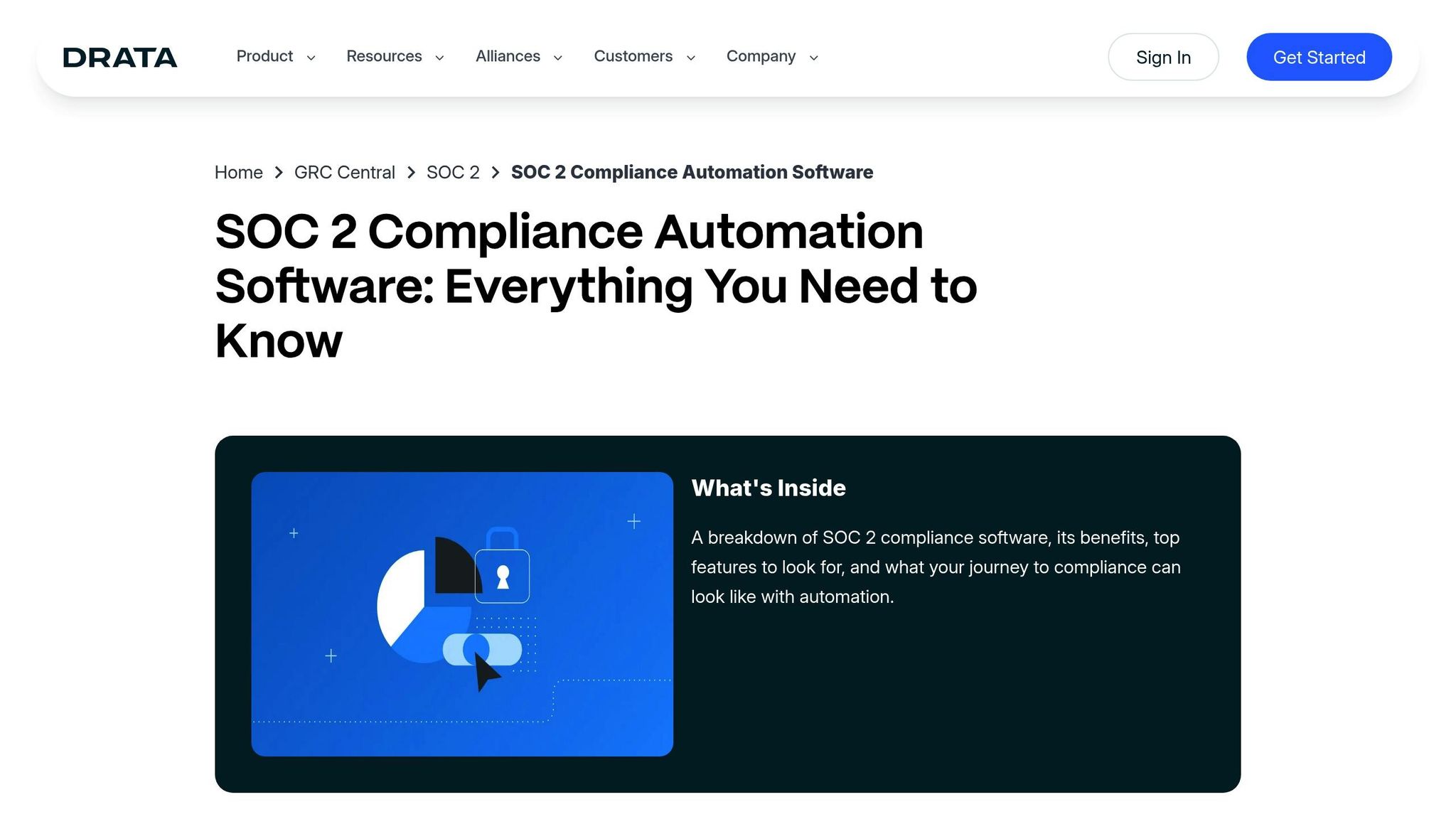
Drata focuses on automating compliance workflows, supporting frameworks like SOC 2 and GDPR. It also offers comprehensive third-party risk assessments and monitors over 100 security controls. For example, Calendly used Drata to cut audit preparation time by 90%. Trusted by over 7,500 companies globally, including more than 30% of the Cloud 100, Drata integrates with tools like Jira, AWS, and GitLab for round-the-clock monitoring. Its ability to map SOC 2 controls to GDPR requirements makes it a favorite for engineering teams seeking automation and real-time insights.
Dialzara
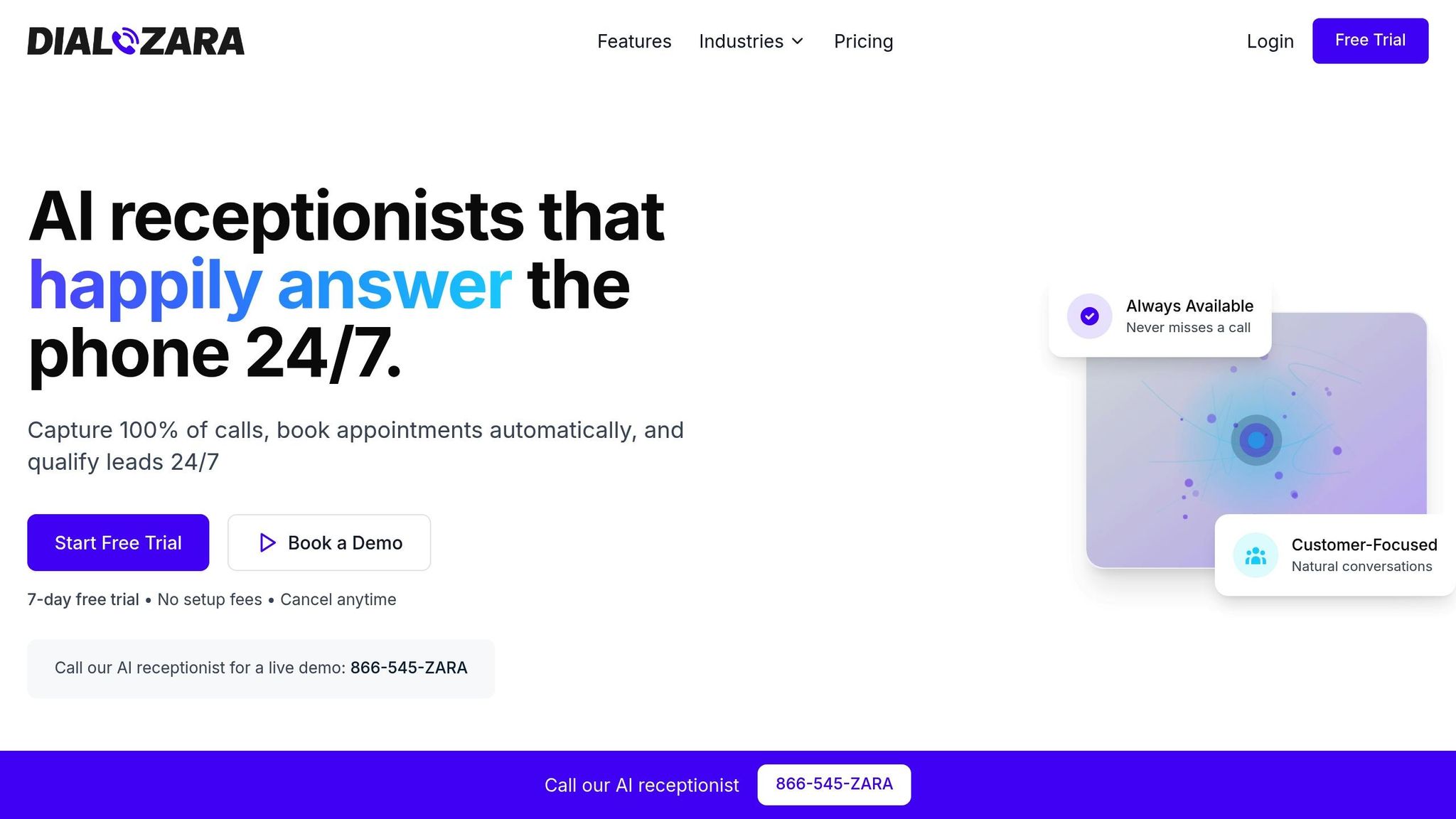
Dialzara is an AI-powered virtual phone answering service tailored for small and medium-sized businesses in regulated industries like legal, healthcare, and financial services. It automates tasks such as call screening, client intake, and data collection while integrating with over 5,000 business applications. This helps reduce administrative burdens and ensures compliance in industries with strict data regulations.
sbb-itb-ef0082b
Comparison Table
| Tool | Best For | Key Strength | Integration Focus | Compliance Focus |
|---|---|---|---|---|
| Cyera | Data discovery & classification | 95% precision in data mapping | Cloud & hybrid environments | GDPR, CCPA, global privacy laws |
| OneTrust | Global compliance management | Multi-jurisdiction support | Enterprise applications | GDPR, CCPA, global frameworks |
| Enzuzo | Small business privacy automation | Website builder integration | WordPress, Shopify, Wix | GDPR, CCPA, PIPEDA |
| Drata | SOC 2 & security compliance | 90% reduction in audit prep time | DevOps & security tools | SOC 2, GDPR, ISO 27001 |
| Dialzara | Regulated industry communication | Over 5,000 app integrations | Business communication tools | Supports compliance in regulated industries (e.g., legal, healthcare) |
Each of these tools offers a unique set of features to help businesses tackle compliance challenges efficiently. By evaluating your specific needs and workflows, you can identify the platform that best aligns with your goals. Whether it's automating data discovery, managing consent, or streamlining communication, these solutions can help protect your business while keeping you on top of ever-changing privacy regulations.
Comparison Table
Here's a detailed breakdown of how these seven tools compare in terms of features, pricing, and capabilities:
| Tool | Starting Price | Key Strength | Integration Capabilities | Pros | Cons |
|---|---|---|---|---|---|
| Cyera | Custom Quote | Data discovery | Cloud & hybrid environments | Advanced AI-powered classification, Real-time risk detection | No transparent pricing, Complex setup |
| Ketch | $0 (Free plan) | Consent management automation | 5,000+ business apps | Flexible pricing tiers, Strong API integration | Limited free plan features, Per-user cost scaling |
| OneTrust | Custom Quote | Global compliance framework | Enterprise applications | Multi-jurisdiction support, Comprehensive features | High cost for small businesses, Steep learning curve |
| Osano | Custom Quote | Website privacy automation | WordPress, Shopify integrations | Easy website implementation, Cookie management | Limited enterprise features, Basic reporting |
| Enzuzo | Custom Quote | Small business focus | Website builders (WordPress, Wix) | Affordable for SMBs, Quick setup | Limited scalability, Basic audit trails |
| Drata | Custom Quote | SOC 2 compliance automation | DevOps & security tools | - | Focused mainly on SOC 2, Limited privacy features |
| Dialzara | Custom Quote | Regulated industry communication | 5,000+ business applications | 24/7 availability, Industry-specific compliance | Communication-focused, Requires call forwarding setup |
Pricing Overview
The pricing for data-sharing compliance tools varies widely. Ketch stands out with a transparent pricing structure, starting with a free plan for businesses managing up to 5,000 unique users monthly. From there, the Starter plan is $150/month, while the Plus plan costs $333/month. On the other hand, most platforms, like Cyera and OneTrust, rely on custom pricing models, which can make budget planning more challenging.
Integration Capabilities
Integration options play a major role in choosing the right tool. The best platforms provide extensive integration features, which are essential since most businesses juggle 5–10 different software tools daily. For example, API integration allows real-time data synchronization, though it often requires 2–6 weeks to implement due to its technical complexity.
Strengths and Market Fit
Each tool serves distinct needs:
- OneTrust and Cyera: Ideal for enterprises needing comprehensive compliance frameworks.
- Enzuzo and Osano: Better suited for smaller businesses that prioritize simplicity and quick deployment.
Implementation Timelines
Implementation times vary significantly. For instance:
- Single Sign-On (SSO) setups typically take 1–3 weeks.
- Custom solutions might require 6–16 weeks.
These timelines are crucial for businesses facing tight compliance deadlines or preparing for regulatory audits. Choosing the right tool often depends on balancing features, cost, and how quickly it can be deployed.
Conclusion
Choosing the right compliance tool is more than just a regulatory checkbox - it’s a way to build trust with your customers while protecting your business from hefty fines. With data privacy rules becoming more intricate, small businesses especially need tools that can keep up with shifting regulations without sacrificing efficiency.
The seven tools we’ve discussed each bring unique benefits, but automation should be a top priority when narrowing down your options. Automation ensures consistent enforcement of policies across all data points, simplifies documentation, and makes audits less daunting by keeping everything transparent and organized.
Integration is another critical factor. Most businesses rely on multiple software tools daily, so your compliance solution should work smoothly with your existing systems. For instance, Dialzara integrates with over 5,000 business applications, making it easier to implement without disrupting your workflows.
Don’t overlook the importance of real-time monitoring and maintaining detailed audit trails. Using compliance dashboards can give you an up-to-date view of your compliance status, allowing you to address issues proactively as regulations shift.
Start by conducting a compliance audit to assess where your business stands. From there, set clear goals based on the specific regulations that impact your industry - whether it’s GDPR, CCPA, HIPAA, or other standards - and evaluate tools based on your operational needs and technical capabilities. Regularly revisiting this process ensures your approach stays aligned with evolving regulatory landscapes.
Compliance isn’t a one-and-done task. It demands continuous monitoring and updates to stay ahead of changes. Choose a tool that evolves alongside your business, offering the flexibility to adapt without requiring a complete overhaul.
FAQs
How can I choose the right data sharing compliance tool for my small business?
When searching for the right data sharing compliance tool for your small business, start by pinpointing the regulations you need to meet - whether it’s GDPR, CCPA, HIPAA, or others. From there, prioritize tools that provide strong security measures like encryption, are user-friendly, and can work smoothly with your current systems.
Choose solutions that make compliance easier while keeping your data secure. To make an informed decision, consider reading user reviews and taking advantage of free trials or demos to see which tool fits your business requirements best.
What should I consider when choosing a compliance tool that integrates with my business systems?
When choosing a compliance tool, it's important to find one that works effortlessly with your existing business applications to prevent any interruptions. Opt for tools with automation capabilities to simplify workflows and minimize manual tasks. Make sure the tool delivers frequent compliance updates to keep up with changing regulations and incorporates strong security features, such as encryption and user access controls. Also, consider tools that allow for customization, so they can be tailored to fit your business's specific requirements.
How can automation tools help businesses manage data privacy and avoid regulatory fines?
Automation tools make managing data privacy easier by offering features like real-time monitoring, automated handling of user requests, and simplified compliance reporting. These capabilities help businesses keep up with regulations, cut down on human errors, and lower the chances of facing expensive fines for non-compliance.
By taking over repetitive tasks and providing constant oversight, these tools free up businesses to concentrate on growth while maintaining customer trust. Choosing the right tools protects sensitive information and ensures businesses stay compliant with changing data-sharing rules without unnecessary hassle.
Summarize with AI
Related Posts
AI Consent Management Best Practices: Your Complete 2025 Guide
Learn the 10 best AI consent management practices for 2024 to handle user data responsibly, build trust, and stay compliant with evolving AI technology.
10 Tools for IP Compliance in AI Governance
Explore essential tools for managing IP compliance in AI, ensuring regulatory adherence while protecting sensitive data and minimizing risks.
Best Software for Automating Document Retention Policies: 7 Top Tools for 2025
Explore essential tools for automating data retention, ensuring compliance, reducing errors, and streamlining workflows for your business.
EU-US Data Privacy Framework: Business Compliance Guide
Discover how to navigate the EU-US Data Privacy Framework for seamless data transfers while ensuring EU citizens' personal data protection.
